Lisa Niver's Blog: We Said Go Travel, page 380
July 13, 2014
Freedom from Fear
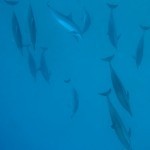
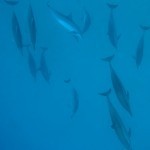
I didn’t learn to snorkel as a kid. I had one visit to Barbados when I was 22 and a friend of the family taught me the basics. I was amazed at how hushed the world became when I put my head underwater with the ability to breathe. Everything went away except my heartbeat, my breath and the beautiful world under the sea. I went another couple of times in Hawaii in my 40’s after my kids were old enough to go along. Again it was magical and special.
Then I got cancer. Out of left field my world changed. While I was going through the multiple surgeries and the treatments and the general lousiness of cancer I dreamed about two things: snorkeling and skiing. I imagined myself snorkeling while face down in the MRI tube. I told myself that skiing would happen again. That I would find myself on that mountain and I would fly down it with the wind in my face and I did. A year after the majority of my treatment was over I skied and it was fabulous. There were still many things to come that would challenge me feeling free and easy again but at that moment, in Colorado I didn’t know about them. I just felt the sun and the cold and the wind and strength in my body as I cruised down the mountain.
The following summer we planned a trip to Hawaii. It was a well deserved trip after a bout with a nasty case of pneumonia caused by valley fever. My best friend told me I had to go out on a boat belonging to a friend of hers and swim with the dolphins. There are many people who have issues with this, suffice it to say if the dolphins didn’t want to be where I was they would be gone.
We got up early and went out on the boat. Just the four of us, my husband, our two daughters and myself went with the Captain and his assistant. When we got close to a pod of dolphins I was first in the water. I panicked for a moment before I trusted my snorkel completely and with my heart pounding I convinced myself to let go. Then I just floated on top of the water and watched them dance beneath me. 40 or more dolphins were spinning and swimming and playing beneath me.
In that moment I was free. As I held my breath and dropped beneath the surface I felt all my fear vanish. The quiet surrounded me and all I could hear were the sounds of the dolphins, my breath and my heartbeat. All those fears of the last 2 years just melted away and I was one with the life underwater. The questions of would I live or die, would they have to remove something else, would my kids lose their mom early or would I get to be an old woman and grandmother, would my husband become a widower or would we have a 60, 80,100 year marriage– all of them floated away and I was just there feeling peace.
Where do I feel free now? Anywhere I am because of the rhythm of nature and the hearts of those dolphins. Anytime I start to get scared again I just think of them and how they are waiting for me to return for another swim in peace.
About the Author: Angelique L’Amour is a wife, mother, writer and cancer survivor. She loves to travel and gives her time to her family, her writing and to The Get In Touch Foundation
Thank you for reading and commenting. Please enter the Independence Travel Writing competition and tell your story.
The post Freedom from Fear appeared first on We Said Go Travel.
July 12, 2014
Field Worker
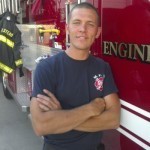
Field Worker
All morning, bussed South from Mexico City,
I watch Volkswagens and motorcycles-
some with three riders- blur by in a stream of color and faces.
Blue smoke puffs from chrome tailpipes,
the putter and exhaust of worn rings
and neglected metal that will soon seize.
If angels breath, they won’t fly here.
Not where the Sierra Madres
pierce the sky like ghosts armored in beryl-horned caps
as if to readying to march.
Not in this place where a blight falls quiet
from the same slack sky, coating the sugar cane’s electric green.
Jose says the field workers are dying by the thousands
of a mystery kidney disease,
says the newspapers lie,
reporting any pesos for a study would be a waste,
because workers drink tequila
stay out late
say they chew cane pulp instead of food.
I’ve been on this bus too long not to care,
and so I mistake the low-flying crop-duster for something holy
when it glides by,
streaming parathion and paraquat in contrails from its wingtips,
which descends, spreading over the men in a blue cloud
so it looks as if the cane is harvested by the dead.
I think of working McDonald’s weekends,
how I always thought the managers jobs were to care,
that they sat in the office studying Material Safety Data Sheets
as I hunched in a black apron over the grill,
scrubbing it with the scouring acid that looked benign as dish soap
in its clear package that I scissored open,
but would settle like lesions into my hands,
ghosting them for months after.
What my great-grandfather said about working coal seams for scrip-
the stamped-out copper coins they could only use in the company store-
they gave us shit and called it sunshine-
how he emerged from the dark of a twelve hour shift
to the dark of night, exhaling carbon
and wiping black from the creases in his eyes.
I open my eyes again on the fields,
thinking of what we allow settle into us and see many
like my grandfather- the truly working dead,
their leather-worn hands rasping the bead tighter up the bolo
of their straw hats.
I see them in loose pants and chambray,
I see them in helmets with spit-carbide lanterns.
I see them working the field the same as I see them in a hole,
hobbling bundles of cane
to the rusted beds of pickups and longbed trailers
like mining cars doing not what they want,
but what they believe they must.
About the Author: Jonathan Travelstead served in the Air Force National Guard for six years as a firefighter and currently works as a full-time firefighter for the city of Murphysboro. Having finished his MFA at Southern Illinois University of Carbondale, he now works on an old dirt-bike he hopes will one day get him to the salt flats of Bolivia.
Thank you for reading and commenting. Please enter the Independence Travel Writing competition and tell your story.
Going to Mexico? WSGT found these travel books and gear to help you prepare.
Lonely Planet Mexico: The world’s favorite travel guidebook series.
Travel Hat: Keep your head and shoulders out of the sun with a great hat.
Medical kit: Stay healthy in unexpected situations
The post Field Worker appeared first on We Said Go Travel.
Everywhere I’ve Ever Been
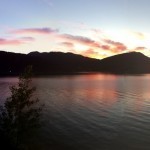
My eyes are closed. The harsh curves of my office chair beneath me submit reluctantly to the contours it has known for the past two years. To my left, frost coats the edges of the window panes, spreading out like shaddered crystal. The low, idle hum of my computer monitor drones on without pause. The once smooth hardwood floor below me feels raw beneath my rubber soles. My hand firmly grasps the fresh cup off coffee in front of me, grateful for the warmth it provides. Two feet away a phone rings. The echoing sound is abrasive against the blank unadorned walls that surround me.
My eyes are closed. Salty air fills my lungs. Its taste lingers momentarily on my tongue. Below me, the sloping ground drifts soft and warm. There is sand between my toes, beneath me, soothing between my fingers. The sun shines through my eye lids and its warmth is instantly absorbed by my face, my bare arms, my back. Waves crash softly before me. The spray gently dots the tops of my feet. In the distance, puffs of clouds tower into the sky and sail effortlessly over the turquoise waters below.
My eyes are closed. The aluminium bike rests between my legs. Its black rubber tires radiate a soft heat onto my calves. There is noise everywhere. Car horns, street vendors, talking, laughing, yelling. The warming sun heats the expanding pavement causing a carnival of odor to overtake the precious few pockets of fresh air around me. Sweat oversaturates my bow and begins to race down my face, leaving behind a salty streak of sheen. As the light turns green, hundreds of cars, bikes, and pedestrians continue their daily campaign across their urban jungle, passing my idleness quickly and sending waves of humid air in their wake.
My eyes are closed. My feet dangle over the ledge of grass. The waning light of the day yields to waves of colors across the sky, smokey reds, shadow blues. With the evening comes a cool breeze, its effect stronger now with nightfall. Sheep flock behind me, eating the last of their sunlit patches before retiring back into the hills for the progressing night. The fresh water of the lake advances and recedes in endless cycles below me, momentarily covering the small rocks and pebbles that frame its arching shoreline.
My eyes are closed. A great nothingness expands on all sides. In the paleness of the waxing moonlight, mountains mitigate the threshold between heaven and earth. Not a soul creeps in the frigidness of the night. There is silence. Only the stars stir. A silent and cyclical revolution of the heavens. Above me stars form pictures atop their eternal black canvas. There is a scorpion. There is a cross. There is infinity in every direction.
My eyes are closed. I see my office in Chicago. I see the beach of Garden Key. I see the streets of Beijing. I see the shores of Lago Rupanco. I see the stars of Atacama.
I’m everywhere I’ve ever been.
My eyes open.
I’m already there.
About the Author : Montana Crady decided that traveling is much more fun than working in an office, so he decided to pursue that endeavor full time. He now spends his mornings traveling to new places, his afternoons exploring them, and his evenings dreaming of the wonderful things life has in store for him tomorrow.
Thank you for reading and commenting. Please enter the Independence Travel Writing competition and tell your story.
Ready to quit your job and go travel? WSGT found these travel books and gear to help you prepare.
Lonely Planet Chile: Go to Chile knowing what you’re going to do
Hiking poles: Save your knees from all the hiking on any trip.
Laptop Bag: Everybody travels with a laptop, might as well secure it with a good bag!
The post Everywhere I’ve Ever Been appeared first on We Said Go Travel.
July 11, 2014
Ten Hours in Madrid
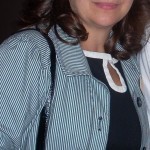
There are cities that cause an impact at first sight they open their arms to touch you softly, bewitching you with the smell of their vegetation, of their meals cooked outdoors, and with the unmistakable sound of their music, not to mention the accents of their people: the great community who opens their doors every morning to receive the first rays of sunshine, to drink their coffee sitting next to the flowers planted in pots on the small balconies of the old buildings in the most significant avenues of the metropolis.
In large cities, there are streets that transport us to small towns we had visited in our childhood; there are places that make us cry our eyes out remembering times past when we danced in circles singing nursery rhymes: “The chickens in my casserole. . . .”
Madrid is such a city: it is the cosmos that contains ancient stories within their lofty buildings. I see Madrid as the imprint of our cultures seen through the eyes of our mother. Even though for some of us she has been a bad mother with ruthless characters, her imprint is still present in the streets of Cartagena de Indias, Guatemala, Quito, or Panama.
To visit Madrid is to read a history map backwards. It is as if we were traveling to a past for which we do not have any reference. Can you imagine walking through time, strolling the streets of the city we have before our eyes, and to have just ten hours to discover it?
As soon as we start our tour we can see our reflections in the churches, in the cooling fountains at the plazas, and in the arches that festoon Madrid, which, somehow, accompanied us in our childhood, thousands of miles away.
Perhaps arches and plazas were conceived in Madrid to be replicated in their former territories? ¿Perhaps in a visit to the big city we realize we had seen them reflected on an ancient map we had found hidden in the trunks of our great-grandparents, and they start now to materialize as we take a stroll on Calle de Alcalá, Plaza de España, and Puerta del Sol?
This city, far away from the sea, bathed by a bright light and by the fresh, summery air of August, charms its visitors and undoubtedly will make them come back to find out more about those stories that we only came to know through history books when we were learning about the importance of powerful navigators and about those who believed to be closer to an almighty God who spoke another language.
In 2014, Madrid has overcome the darkness of March 11, 2004, and the train stations come back to life once again in the wee hours. The denizens of Madrid wake up, and the tourists ride on double-deckers instead of subways in order to discover a city that has been replicated bit by bit in the New World, in high-steeple churches, and in the rings of the sharply criticized bullfights.
Surrounded by stuffed bull heads, people have lunch at some restaurants. The tiles on their walls have been artistically made, showing bullfighting figurines striking a pose, flaunting the sumptuous costumes of the matador and his team. In the dining rooms, one can feel the festive atmosphere of an afternoon at the bullring. The colorful murals replicate bullfights that have made Spain so famous throughout the world. Under the shadow of the noble animal’s head, diners enjoy their shrimps in garlic sauce, their breads that have been baked using ancient recipes and, like in any Spanish good table, their exquisite white or red wine or, come August, their refreshing summer reds.
Madrid in ten hours was an exciting adventure, through which we were able to ascertain that the streets and plazas of the cities where we grew up are a mirror of the past.
I greeted Madrid during the ten hours we spent in our visit and I saw my reflection in it: I know the sounds its people make; I learned to utter my first words with them; I nurture that Spanish language that surrounds me and impels me to write these lines in order to say that it is impossible to get to know you in just ten hours. However, it was time enough to savor the days of our childhood when I could only hear and speak your language.
We used to cry and to love to the sounds of your plazas and tree-lined avenues. . . Madrid in ten hours.
About the Author: Jacqueline Donado freelance journalist, living in New York City former Managing Editor of El Diario/La Prensa (NYC), graduated from Universidad Autónoma del Caribe (Barranquilla, Colombia). She worked as a correspondent for the Colombian newspapers El Espectador and El Tiempo, and later traveled to the United States to study at Poynter Institute in St. Petersburg, Florida. She provided live coverage of international disasters, such as floods in the Dominican Republic and Haiti, and an earthquake in Colombia, as well as of other important sports events, such as the 2004 Olympic Games in Athens, Greece.
Thank you for reading and commenting. Please enter the Independence Travel Writing competition and tell your story.
Inspired to take on Madrid? WSGT found these travel books and gear to help you prepare.
Lonely Planet Madrid: The best book out there for the capital city.
Lonely Planet Spain: The best travel guide for Spain
A great travel journal: Keep track of your trip in a journal
The post Ten Hours in Madrid appeared first on We Said Go Travel.
Dangerous Freedom Tallied in Youth
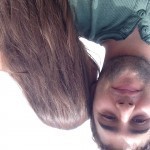
Because of some ultra-mindfucky, nefarious human schemes and some unintentional collateral damage too, so much of the man-made world has become a devastating force to my freedom. I was involved closely with the value corrupt business described in a certain famous author’s famous essay ^1 (which if mentioned in paragraph and given such prominent space on the page would be the only thing you’ve read by now but is so infallible and brilliant on the subject it replaces pages of quivering explanation) which depicts the absurd twenty first century realized nightmare of a ‘cruise’. On a similar excursion to an overpopulated corral reef I watched an extremely obese women trample corral in my upper periphery while I hovered next to a rare sea turtle twelve feet diagnally below her. This is how I’ve come to feel for the majority of my life: I’m propelling myself away from the surface, immersed in a separate world with a life-force that wanders areas vaster than I can truthfully ascertain a mental image of.
In Bermuda my brother and I managed to get granted road access on mopeds after a brief and hilarious training session performed by a drunk man named Crock who would occasionally blurt out his opening line for tourists, “Welcome to Bermuda, here we drive on the left side of the Rudd” in true satire. So twenty four hours after dodging my overly alpha cousins and solemnly losing a hundred dollars at a black jack table that, if it were just a mere two hundred feet bellow itself, in the murky blue lost-ness of the ocean itself, would only earn a tinge more of a depressing atmosphere, I was helmetless, barely trained, turning a throttle on one of the three main roads on an island three hundred miles off the coast I spent all my life on, surrounded by a myriad of nature’s tropical amenities. Holy be any dangerous freedom tallied in youth unscathed. Sure, I was fearful. My younger brother was more confident. But when I got to my moments, and I was trusting the leaning of my body, and making much of the faces I saw, and giving all quiet ovation to the immaculate ocean on my side, and the crowding trees on each side, and the hilariously over-sized buses…
Since this is the world where all everyone does is try to kill me in the most roundabout way possible we needed to make it back to the boat by sundown for something or other. What we needed to be back on the boat for was the equivalent of Prom when we should have been way out in the midwest, wandering up to other people’s camp sites becoming subversives and vagabonds. We were scheduled to go back to the mall when we needed to go to the dusk covered shores. We were scheduled to be scheduled when we needed to have nothing at all specifically to do. This utter lack of a worthy purpose snowballs through our calendars. That night, we debated a down-right insubordinate early escapade back to shore, beginning around 5 am to make the hour and a half moped trip entirely from one end of the island to the other, from Royal Wharf to the early seventeenth century church St. Peter’s at the other end. While I had my brother on the line for it, a combination of my unhappiness and his concern with the social landscape of the boat sunk our pilgrimage the night before. When I realized it was done for, wandering around the boat with a drink around 11pm, planning my retreat to my cabin, I had the stark sensation of losing something I didn’t yet understand
So, here it was, I had my wings, briefly, the fucking wings of flyin’ down the left side of the rudd, and then before I knew it I was trapped again. It is the fodder of teen cinema to prove that the man who rode off fearful, but overcome by a creeping joy, is the same man later, when followed in upon by the heaviness of life. I wrote a poem on the upper deck about a ghostly figure who can be seen acting out my life in excellence. When I slept, he was up at the writing table. He was standing at St. Petersburg overlooking the far shore. I am hurling the courage upward in his name. I’m branding myself the apprentice of this esteemed ghost.
About the Author:
Chris Milea is the aspiring boyfriend of a local waitress. He lives on the lower east side of New York City with a couple of poets and is 24 years old.
Thank you for reading and commenting. Please enter the Independence Travel Writing competition and tell your story.
Ready to tackle the USA? WSGT found these travel books and gear to help you prepare.
Lonely Planet Bermuda: The best travel book on Bermuda
Mens Travel Shirt: Stay cool on your trip with a breathable shirt.
Swiss Army knife: A good travel knife is always good to have
The post Dangerous Freedom Tallied in Youth appeared first on We Said Go Travel.
July 10, 2014
Lost In the Pacific
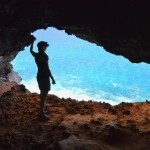
There I was, standing among the great rock sculptures that define Easter Island. The giant Moai were in their timeless stance, staring down at me as the ocean waves crashed against the rocky coastline. Horses wandered freely, foraging for nutrients amid the volcanic rocks that dominate the landscape of this island, lost in the middle of the Pacific Ocean. It had been a long and harrowing journey for me to get there in more ways than one, but it was a journey that had set me free. Free from a relationship that had been suppressing and suffocating me in ways I was only beginning to understand. Free from a life I knew in my heart wasn’t meant for me and free to spend 6 weeks of bliss exploring South America. Freedom that only travel can bring.
Rewind 3 weeks. My long-term boyfriend and I had been going through a difficult time. There wasn’t any fighting, yelling, hurt feelings or the usual stuff that you think of when it comes to break-ups. We had been avoiding the elephant in the room for some time now, only to find that ignoring the problem doesn’t simply make it go away. No, this elephant had been growing steadily, ever increasing in size until one day, I just couldn’t ignore him anymore. He had been smothering and suppressing the real me for too long, trying to force me into a role that I simply wasn’t meant to play: I don’t want to have children. My boyfriend had always talked about starting a family one day and when we first got together, all those years ago, I was young and hadn’t really given parenthood much thought. I figured that one day I would want to start a family like everyone else. That maternal instinct would appear out of the blue and my boyfriend and I would get married, buy a house and have kids. But almost 7 years into the relationship that maternal instinct had yet to show its presence in me and I was feeling cornered, suffocated, panicked at the thought of giving up my life, my dreams of traveling the world, for a baby and a mortgage. It was a countdown to the end of my life and start of one I didn’t really want. But saying that out loud, acknowledging that fact would mean a break up from my best friend, my confidant, my partner in crime for all those years. This was the man I loved and thought I’d spend my life with. It was a thought too horrible for either of us to consider, thus we left the elephant alone. All the while he grew bigger and bigger until one day I had to speak up.
And so 2 weeks before my trip the elephant was finally kicked out of our lives for good. We broke up, mutually acknowledging but hardly accepting the fact that we would no longer be a “we”. I had had this 6 week backpacking trip to South America planned for 6 months now and it finally dawned on me that it had been my unconscious escape plan all along. Then the day came. I boarded a plane alone and flew to Santiago, Chile to meet up with a girlfriend, unsure of what life I would be returning to at the end of my trip. Together we made our way to the remote Easter Island in the middle of the Pacific Ocean, to explore a strange new land. Our first day on the island we set out to walk the coast line with no real plan or itinerary. We were letting the universe guide us and I have never felt so free in my life. Free to finally be myself, free to finally say that I don’t want to have kids without worrying about the consequences. I had faced my worst fears and had nothing left to loose. I was free from any expectations of what my life should be, free to simply be there in the moment. I relished in this new found freedom and independence, one that is only magnified while on the road. That day was one of my best days traveling, as we wandered along an unmarked dirt road beside the coast. Discovering Moai statues that had tumbled over and unmarked lava tubes/caves that simply dropped off into the ocean, I felt like an explorer uncovering a lost world. The wildness of this little island, off in the middle of nowhere, set me free. I knew that although heart-broken over the end of a wonderful relationship, I had made the right decision for myself. I was a strong, independent person and I knew that I would be able to find my way in this incredible world.
About the Author: Jill Naprstek is new to the travel writing and blogging world, having recently started her own blog called AdventureJ.com. While she lives and works full time in Ottawa, Canada as a Paramedic, this adrenaline junkie suffers from wanderlust and seeks out new and exciting adventures both at home and abroad.
Thank you for reading and commenting. Please enter the Independence Travel Writing competition and tell your story.
Intrigued to experience Easter Island? WSGT found these travel books and gear to help you prepare.
Lonely Planet Chile and Easter Island: The best travel guide in the world.
Travel Pants: Good all around pants are an essential item on any trip.
A pocket knife: It’s always good to have a pocket knife in certain situations.
The post Lost In the Pacific appeared first on We Said Go Travel.
July 9, 2014
Monet Waits
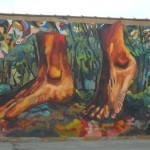
He was Italian, she Slovakian. Stuffed backpacks sit on the ground beside them. I see the guidebook. The entire US of A squished onto the pages of a book the size of a brick. I have held so many of them in my hands, but never, not once, was it my country. I’m shamefully over-excited by them, or more accurately, by that brick-book they have. They hand it to me and I eagerly flip to the page where My City will be rightfully glorified in words.
“Halfway between Syracuse and Buffalo,” it reads, “sits Rochester, NY.” Then, to put it mildly, it tells you to continue on your merry way because everything worthy of seeing is certainly not here. I’m hurt.
I’ve quit my job to travel nine times. But I always return home, to this not-even-a-paragraph-worthy-city in the US. Travel is always an unleashing of sorts. It is not intended to do this, but then we are there and it happens and we return. We leave for a month and we have been away for decades. And everyone else is still, still pushing something heavy up a hill. Only in coming home do we realize the depth of the journey.
“Go to the museum, go to the steakhouse”, I robotically direct the European duo. It’s a pathetic soul-less suggestion, and I know it. My city has flesh and I had handed them bones. I want to take it back; I want to re-write that sentence in the book.
My hotel is clean and crisp and immediately I itch to get out of there. Dutifully, as a “tourist”, I head to the museum. Yes, to the one I sent Mr. Italy and Miss Slovakia to, but had never once set foot in. I’m one block away from Monet, next to the railroad-track-dump when I see it, a portrait of feet on the side of a building. It is just two feet, but precisely and intensely a person; going somewhere. It startles me. I get lost in the immobility of it, the story of it. There’s a fleeing in them. There’s also a freedom. Then I continue walking, right past the museum.
He’s short, stocky, bald, and smiling and he’s waiting for the same bus as I am. I point over to the feet that blew my mind and he says, “Well, our pockets are ripped out, but we still have hands, right?” He was a Rochestarian, I knew by his ‘a’s. We draw the sound out of our ‘a’’s with a whiny long swagger. The statistics say my city is poorer than I. This frightens me in the way that my mom must have felt when I travelled alone far away. But I was never hurt, bothered, or even cursed in those muggy cities. I walked next to them and they walked next to me. But my pockets are still firmly intact. “We still have hayaands”, he said. We have hope and strength beyond substance. I smiled tightly and slowly nodded sideways like a “no”, which is to say, “ain’t that the truth, though, ain’t that the truth?”
I don’t get on the bus. I just keep walking. I continue past the cascading river and duck in to grab a local blue collar beer. Its cold and bubbly and tastes like beer, so I have a third. There’s a crowd here, listening to music on a Tuesday night. “Roch-ster” people that all seem to want some meatloaf, some spicy hot sauce poured on sausages, and some cold, unpretentious beer. The band plays jazz. These are men with last names like Hochstein, O’Malley, Douglass, and Gonzales. These are men whose great-grandfathers built the railroad and the canal, men with day jobs and neckties, men whose kids draw murals of feet on hidden buildings.
The beat gets stuck in my mind and it becomes my eye-opening soundtrack back to the hotel. Past the old subway stop, past the immense library, past the community garden my mom helped plant, past the mansions and the slums, past all the things I used to just drive by. The bravest thing we can do is to re-examine who we are and where we are and why. Sometimes it takes distance to accomplish this. Sometimes it does not.
I collapse in my foreign bed in my cozy hometown and I have a journal that seems too small to hold all my words. Right here, halfway between Syracuse and Buffalo, in the enchanted land of graffiti-meatloaf-jazz, some flesh got on some bones. I dissolve into my dreams. And a decade passes.
About the Author: Tina Murty is a waitress who saves all her money to travel and never wants to retire. Her journals are her most prized, but most easily burned, possession.
Thank you for reading and commenting. Please enter the Independence Travel Writing competition and tell your story.
Does quitting your job to travel sound like a good plan? WSGT found these travel books and gear to help you prepare.
Lonely Planet USA:The best travel book there is on travel in the USA.
Pacsafe camera strap: Keep your camera safe with a steel mesh neck strap.
Journal: Keep memories of your travels with a great journal.
The post Monet Waits appeared first on We Said Go Travel.
More Cheese, Please

In the Swiss Alps, there is a village. And in this village, there is a church. And across from this church, there is a chalet. And in this chalet, there are three people with little shovels of cheese in their hands. One of them is very, very excited.
That person is me.
My friend Anouk invited me and my husband to stay in her family’s chalet when we came to Switzerland to attend a conference. With its simple wood panels and heavy, gently-sloping roof, the chalet looks like something out of another time – and indeed it is. It was built in 1785, which you know because the date is written across the front, along with an explanation of who built it (Alexandre Busset), why he built it (in honour of a woman) and what he was like (prudent). I have never known a building to be so insistent about telling its own story.
We have come to the chalet to enjoy the views of the mountains, which are still lightly dusted with snow even though it’s April and warm enough to wear a t-shirt. But mostly we have come for the raclette.
Raclette is a dish where slices of cheese are heated up over a fire or an electric table-top grill and then scraped onto plates of potatoes and pickled vegetables. There is a certain amount of ceremony to it. Putting the cheese in your little individual shovel. Dusting your cheese with spices. Putting your cheese under the grill and listening to it sizzle as it melts. Scraping the melted cheese onto your plate. Tasting the way the cheese mixes with the soft potatoes and sharp gherkins. Drinking a sip of cold white wine. Repeating the process over and over until your stomach pushes against your belt.
The sun is streaming in through the open windows and I can hear the river rushing in the back garden. Normally the fine weather and scenic setting would tempt me to go outdoors, but I don’t want to move from my seat. It isn’t just the cheese that keeps me there, though it’s delicious and I’ve always been overly fond of the stuff. With raclette, cheese is just an excuse to open another bottle of wine and extend the conversation a little bit longer. For a few hours, your world shrinks down to a kitchen table with a small grill at its centre.
To my left is my husband, who has shared many cheese-based meals with me during our European travels together – smažený sýr (fried cheese) in the Czech Republic, baguettes with pungent Brie in France, manchego with quince paste in Spain, tagliatelle with creamy mascarpone and Parmigiano-Reggiano in Italy. To my right is Anouk, who has taught me so much about the simple pleasures of good food and wine. I have a plate of sliced cheese next to me, ready to be melted, and a glass of Swiss wine that tastes as fresh and clean as the mountain air. For once, I am exactly where I want to be.
About the Author: Katie Lee loves nothing more than cheese, travel and writing about them both. You can read about her adventures in Cheshire and beyond at www.eatingthecheshirecat.co.uk.
Thank you for reading and commenting. Please enter the Independence Travel Writing competition and tell your story.
Inspired to take on Switzerland? WSGT found these travel books and gear to help you prepare.
Lonely Planet Switzerland: The best book on Switzerland there is.
Swiss Cheese: The guide for connoisseurs of cheese.
Swiss German: Your guide to speaking while in Switzerland
The post More Cheese, Please appeared first on We Said Go Travel.
July 8, 2014
Arrival
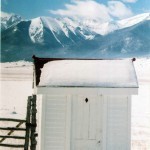
ARRIVAL
Despite having traveled abroad and lived in diverse places – London, Australia, and a 1951 yellow Jimmy schoolbus in Northern California – these days I don’t want to travel farther than I can see. From my tiny cabin, set in a bowl of the Wet Mountains with a head-on view of the Sangre de Cristos, I see far.
On a crystalline day like today, when the temperature’s zero and the light so bright on the snow I wear sunglasses inside, I glimpse the Huajatollas (Spanish Peaks) sixty miles to the south, and the Collegiates far to the north. No trees obscure my sightline. Mountains and me, my dogs, my son, the sun, and wind. Sky and clouds and nobody else. Here at 9,100 feet, we live at what feels like the top of the world. When I drive home up the steep rocky incline called “Little Bad Hill” – not to be confused with “Big Bad Hill” further south – I leave mundane troubles behind for the heights, where ideas emerge sharper, like the spires of the Crestone Needle due west, and emotions richer, like the plumed cumulonimbus roiling up and anvilling out in summer thunderstorms. Here, I can think, feel, and breathe, unencumbered.
Twenty years ago, on a weekend winter escape from graduate school at the University of Denver, a friend and I drove three hours south, then west up 96, climbing the soaring Hardscrabble Canyon, and, not long afterward, setting eyes for the first time on the Wet Mountain Valley, its great expanse not yet scathed by human intent. The small towns of Silver Cliff and Westcliffe claim the valley floor at 7,888 feet, and abandoned mines speckle the hills east of town, but then, as now, one can see far and wide, as the aboriginal peoples did, without feeling fettered by what Huck Finn sardonically called sivilization. One feels small here, like the miniscule figures in Asian landscape paintings the viewer has to hunt to find. Appropriately, one feels one’s humility in the natural world.
We spent a weekend with our typewriters (the manual kind) and our dictionaries (French, Swedish) translating poetry and breathing the clear cold air of a place without traffic or traffic lights, watching through our binoculars red-tailed hawks and kestrels riding thermals. For the first time I’d encountered a land in which I felt free. Free of constraints on my thinking as well as liberated from ordinariness.
One week before, my friend and I huddled in the night at her Washington Park apartment, terrorized, as a helicopter circled over, buzzing the usually quiet corner again and again, a policeman’s amplified voice demanding the person being chased to come out in the street and give himself up. Running footfalls echoed on the spotlit sidewalks. Silent with fear, we trembled in darkness, dreading that whoever was fleeing the law might break into this ground floor flat to hide from his pursuers. Thankfully, he did not.
Although I was born on the East Coast, spent most of my adulthood on the West Coast, and always thought of myself as an “ocean person,” in my thirties and now forties, I find my solace landlocked, here in the Sangres. For two summers, I sojourned on the Oregon Coast after moving to Portland in 1990; then Colorado summoned me back. In the Huérfano and Wet Mountain Valleys, I soon found myself renting cabins and adobes, my Honda packed tight with books and typewriter – not to be replaced by a computer until the twenty-first century. After spring finals, I couldn’t wait to drive the 1,500 miles, to arrive where I could read and write – not commentary on student papers but my own stories.
I do not miss the ocean. I find the Northwest’s forests claustrophobic, the endless moisture heavy on my lungs. Moss grows on the roof of Portland bungalows as if to seal their inhabitants hermetically from light, and it never, ever thunders. Here, now, the sun wakes me in my bed and sets out the dining table window; the coyotes serenade us to sleep. Finally, I am where I want to be.
Thank you for reading and commenting. Please enter the Independence Travel Writing competition and tell your story.
Ready for a road trip around the USA? WSGT found these travel books and gear to help you prepare.
Triple A survival kit: Things that can go wrong will go wrong! Don’t leave for a road trip unprepared!
Medical Pack: Better be prepared for the worst than be unprepared.
Road trip atlas: Get kids inspired for a road trip!
The post Arrival appeared first on We Said Go Travel.
July 7, 2014
Beneath the Smoky Mountains
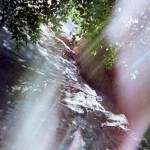
The morning mist settles in the crevices of the valleys so that only the rolling mountain tops covered in green stretch as far as the eye can see. As the sun rises, the mist drifts out of the valleys, revealing their great depths. Out here, nothing can limit me besides my own courage. No cities, few roads, a vast amount of nature to explore in every direction, such is the freedom that I experienced in the Smoky Mountains. Freedom allows people to see the world themselves, to decide their own path, and to think openly about life.
Below the trees and on the open rock outcrops, beyond cell phone reception and technology that demands global awareness and pressures of appearance, I could look into myself without distraction. Like the mist in the valleys, the fog in my mind drifted away allowing me to see the true landscape of my life. For me, life is not about money, a successful career, or anything material; life should be enjoyed with experiences and relationships.
My trip to Red River Gorge brought me into friendship with many people, who I might otherwise have never met. Without technology, we occupied ourselves with each other’s company and card games. Since we were all sleeping in tents together, we made an effort to keep good relations, a practice which many people neglect to use in the modern world. Technology and the fast pace of society limits the amount of social interaction between people, but in the isolation of the mountains, speech and action are one’s only forms of communication.
Although we were in the wilderness away from society, we were always active and never bored. From sunrise to evening we were out hiking rough-terrain and climbing fifty feet and higher up cliff sides. By the end of each day, we were scraped and bruised and our muscles tingled with strain. The feeling could not be described as pain but as pride in our accomplishments. The cuts and splotches on our skin were our battle wounds, earned from our fight against the wall. Victory came not from reaching the top of every climb, rather it was gained by overcoming our self-doubts and climbing higher than we had ever thought possible.
The Smoky Mountains taught me about myself. Unlike the busy world, where people rarely find time to reflect on their lives, the wilderness gave me time each day to sit down by myself without anyone else in view and listen to my own thoughts. Even on the rock face – hanging from a rope, clutching to the rock, staring up at the expanse to go – no voice and no perspective other than my own interrupted my concentration.
Climbing may take two people, but it is a solitary sport for the most part. My route, my risk, my choice is all that matters. It is a freedom that I embrace with enthusiasm. Out in the Smokies, on real rocks, there is no route marked out, no designated holds, nothing except the climber and nature. No one can say what you are capable of, you must prove it to them and to yourself.
Scaling a cliff gives me a perspective unlike any that the rest of the world can provide. When climbing, I saw every detail of the rock and creatures inches from my face and also the broad landscape in full from my perch at the top of the mountain. Internalizing the beauty of nature, I reflected on the details of my life and the larger picture portrayed and found pride in my accomplishments and ambition for my future.
The Smoky Mountains gave me independence by allowing me to reflect on my life and make conscious decisions by myself that brought me lasting friendships and great accomplishments.
About the Author: I love to travel and camp in nature, away from big cities and lots of people. It is one of my dreams to visit all of the US National Parks before I die. I am currently a college sophomore studying Writing and Geography.
Thank you for reading and commenting. Please enter the Independence Travel Writing competition and tell your story.
Ready to hike the Smoky Mountains? WSGT found these travel books and gear to help you prepare.
Hiking the Smoky Mountains: The best book on the market for hiking in the national park.
The best trekking poles: Save you knees and your back with a great pair of trekking poles.
A great compass: The worst feeling is when you’re lost. Never get lost again with a good compass.
The post Beneath the Smoky Mountains appeared first on We Said Go Travel.
We Said Go Travel
We Said Go Travel is a global community of over sixteen hundred writers with articles from every continent.
Stories are shared with photos and video from a perspective of the transformative power of travel. We Said Go Travel has hosted live and online events as well as travel writing contests around the world. ...more
- Lisa Niver's profile
- 57 followers



